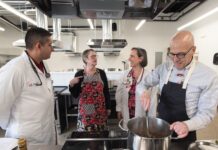
Raymond A. Kent School of Social Work and Family Science Associate Dean for Research Crystal Collins-Camargo is helping students understand how the latest evidence can make a big difference in social work practice. As the school’s interim dean, Collins-Camargo is now leading the school. UofL News reached to learn more about her life’s work and direction for the future.
UofL News: Talk about your passion for research.
Collins-Camargo: As a social worker, the first thing that typically comes to mind is not research. Rather, one would more likely think about helping people address life’s challenges, lifting the voices of historically underrepresented groups and individuals, and advocating for social justice for all people. But what I have come to understand over the course of my career is that if we want to do any of those things well, we must have rigorous research to inform that work. This is one of the most important things we can do for our students—help them learn not only the knowledge and skills they require to be competent practitioners, but to embrace the need to inform our work with the latest evidence regarding how to practice in a way that makes a difference.
UofL News: What are some strategies for creating additional research opportunities for students at the Kent School?
Collins-Camargo: This starts with building an appreciation for research in our students, most of whom come to us to learn how to be social work practitioners. Once we light that fire, there are many opportunities for our students to be involved in the wide range of research that is going on at Kent, including what is happening at our Center for Family and Community Wellbeing which provides an array of research opportunities for students.
UofL News: How did you know that research would be a focus of your life’s work?
Collins-Camargo: I did not know this for a very long time. I came to academia as a second career after many years as a child welfare worker, supervisor, manager and advocate. My progression into higher education happened as I continued to seek a role in which I could truly make a difference. I became principal investigator of my first federal grant a year after assuming a fulltime faculty position. I applied for the grant because I wanted to be a part of an opportunity to help child welfare workers and their organizations serve children and families—I didn’t think about it as research. The next thing I knew I was leading a four-state research project, and collaborating with the inspiring researchers evaluating each site’s intervention. Before I knew it, I was hooked, because I could hear and see the impact that was having on the people doing incredible work in child welfare agencies.
UofL News: Your studies focus on strategies to help public and private child and family serving agencies improve their work with these families. Tell us about this.
Collins-Camargo: Over time, much of my scholarship has come to focus on how these organizations, and the supervisors and managers within them, can put processes, structures and tools in place that promote the use of data to inform practice in terms of whether what they are doing is making a difference for the children and families with whom they work. When I was working in the field, we did not have access to data that enabled us to use it in this way. This also involves interorganizational relationships, because if we want to impact the well-being of children and families, both public and private agencies must be involved. In social work, our research is community-engaged, so this means getting out there and working in partnership with these organizations on how they function so they can help the families they serve, and that is an exciting privilege.
UofL News: What are some other outcomes of your research that have improved practice in the social work profession – any that make you particularly proud?
Collins-Camargo: I have had the privilege of being involved in some really incredible work—enhancing the type of supervision frontline child welfare workers receive so they are supported, and encouraged to use evidence to support the decisions they make in their work with families; working with state child welfare systems on the way they approach public/private partnerships to promote positive client outcomes; and implementing standardized screening and assessment for trauma and behavioral health needs of children entering out-of-home care in Kentucky. Most recently, I published a paper on the perceptions of public child welfare administrators on promoting equity and antiracist practice within these systems that we now understand have contributed to oppression and harm to some families. I am proud of that study because this is a defining moment in time for child welfare agencies, and they must change to antiracist approaches to promote well-being in children, families and communities.
UofL News: As you now serve in the role as interim dean, what is your vision for the Kent School?
Collins-Camargo: As an interim dean, I see my job as keeping the Kent School of Social Work and Family Science on course to promote the vision we have already established as we search for a permanent dean. We need to continue to do high quality research to address the many social problems our faculty are focused on, and to continue to prepare our students to be critical thinkers and competent social workers at all levels. For us that means continuing our efforts to build an antiracist curriculum which former Dean Jenkins initiated before he left. My short-term vision is that we will be in the best possible position to enable our new dean to be successful in leading us forward.































